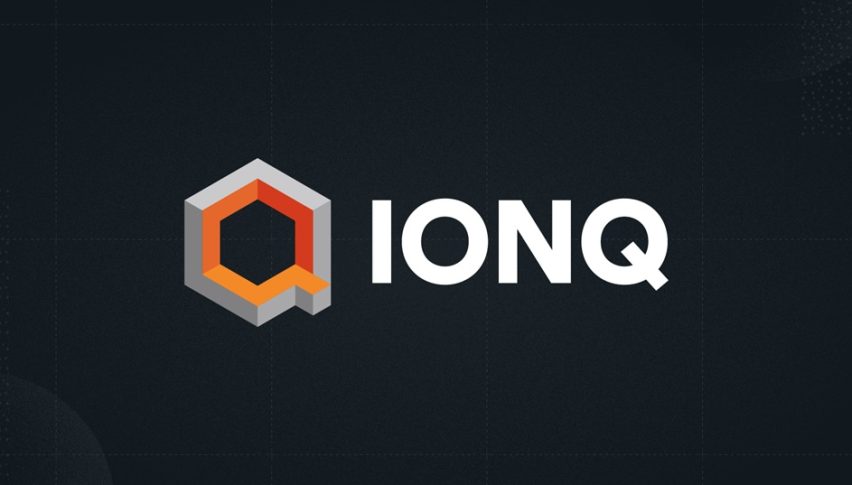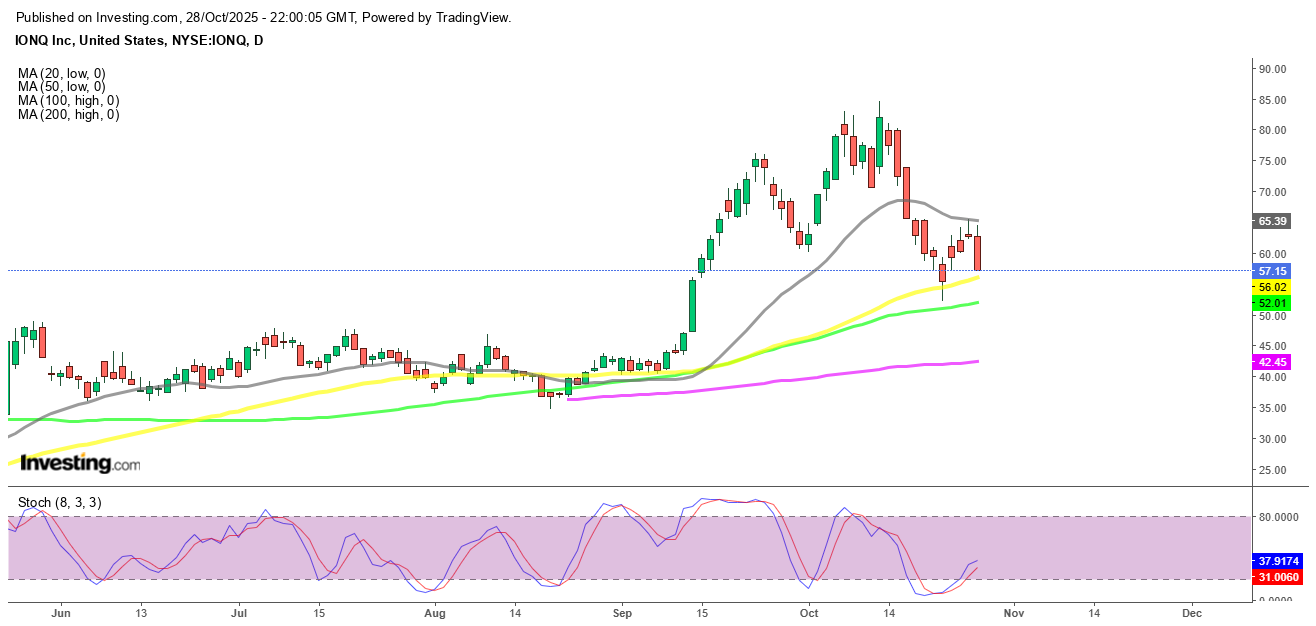IonQ Stock Crash Resumes Amid Secondary Offering as AI Hype Fades
IonQ's stock is currently plummeting due to dilution concerns and waning investor enthusiasm, following months of exuberant increases and...

Quick overview
- IonQ's stock experienced a meteoric rise to $82.09 before collapsing due to dilution fears and fading investor enthusiasm.
- The announcement of a large secondary share offering triggered a selloff, raising concerns about shareholder dilution and the company's reliance on capital markets.
- Technical indicators show a bearish shift, with key moving averages now acting as resistance, suggesting a broken bullish sentiment.
- Despite its pioneering status in quantum computing, IonQ's high valuation remains unsupported by its minimal revenues and uncertain commercialization timelines.
IonQ’s stock is currently plummeting due to dilution concerns and waning investor enthusiasm, following months of exuberant increases and government-fueled speculation.
A Spectacular Rise Followed by a Swift Collapse
IonQ’s 2025 journey has been nothing short of chaotic. The stock began the year trading below $20, before embarking on a blistering rally that carried it to a record $82.09 by mid-October—a meteoric 400% surge in just six months. However, what goes up fast in speculative markets often comes down even faster.
Since topping out, IonQ has endured a steep reversal, with the stock tumbling sharply amid a wave of profit-taking. After a brief and unconvincing rebound last week, the decline resumed aggressively on Tuesday, when shares plunged another 9%, defying the broader market’s upbeat tone. While most major tech stocks climbed on optimism surrounding U.S.-China trade talks, IonQ found itself heading in the opposite direction.
Secondary Offering Sparks Selloff and Investor Frustration
The immediate catalyst for the renewed selloff came from IonQ’s announcement of a large secondary share offering, which raised concerns about shareholder dilution. The move blindsided some investors who were already nervous about the company’s lofty valuation and limited commercial progress.
Analysts note that while additional funding might strengthen IonQ’s balance sheet, it also signals that the company is still dependent on capital markets rather than sustainable revenue generation—hardly reassuring for a stock trading at over $20 billion in market capitalization, despite minimal income streams.
Technical Breakdown Confirms Bearish Shift
The technical picture has deteriorated rapidly. After collapsing from $82 to $52 last week, IonQ managed a shallow rebound before hitting resistance near the 20-day simple moving average (SMA), which has now flipped from support to resistance. The failure to regain momentum suggests that bullish sentiment has been decisively broken.
IONQ Chart Daily – MAs Turing Into Resistance, Points Down
On Tuesday, the chart printed a large bearish engulfing candle, as the price slid from $62.80 to $57.15, confirming renewed selling pressure. The breakdown through key moving averages implies that the uptrend has fully reversed, with short-term traders likely shifting from buying dips to selling rallies.
Government Rumors and Speculative Hype Fade
Much of IonQ’s stunning run-up was fueled by political speculation rather than business fundamentals. In late October, The Wall Street Journal reported that the Trump administration was considering taking minor equity stakes in several quantum computing firms, including IonQ, Rigetti, and D-Wave, as part of a broader national security initiative to bolster American leadership in emerging technologies.
That report ignited a frenzy, with retail traders piling into the stock on hopes of direct government backing. However, those rumors were swiftly denied by the White House, sending shares into a tailspin as speculative buyers rushed for the exits.
Valuation Concerns Take Center Stage
Even after the sharp pullback, IonQ remains massively overvalued relative to its fundamentals. One market strategist described the stock’s surge as driven by “optimism, hype, and political narrative rather than real earnings power.” With minimal revenues and uncertain commercialization timelines, the company’s rich valuation now looks increasingly untenable.
IonQ’s current market capitalization near $20 billion implies expectations of exponential future growth that the company has yet to demonstrate. As investor focus shifts from potential to performance, those lofty assumptions could continue to deflate.
Outlook: From Quantum Boom to Market Reality
IonQ’s dramatic reversal underscores how swiftly momentum can turn in speculative sectors like quantum computing. The company remains a pioneer in the field, but the stock’s volatility—and its disconnect from business fundamentals—highlights the growing divide between technological promise and market discipline.
With dilution worries mounting and government hype fading, IonQ may face a long road to rebuild investor trust. Until it delivers tangible commercial results, this once high-flying quantum stock may continue to struggle against the gravitational pull of reality.
- Check out our free forex signals
- Follow the top economic events on FX Leaders economic calendar
- Trade better, discover more Forex Trading Strategies
- Open a FREE Trading Account
